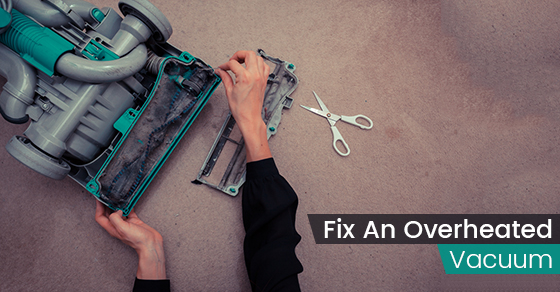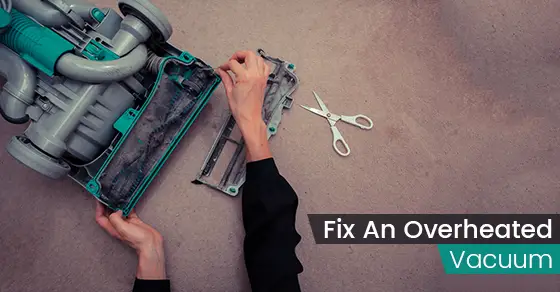Is your vacuum cleaner overheating and shutting down in the middle of your cleaning session? Don’t worry; you’re not alone! Overheating vacuum cleaners are a common issue that many homeowners face. However, if you’re not sure how to fix it, it can be frustrating and time-consuming. In this article, we’ll discuss some simple steps to help you fix your overheating vacuum cleaner and get back to cleaning your home in no time!
First, we’ll explain why your vacuum cleaner might be overheating and what causes it. Then, we’ll provide you with some practical tips and tricks to prevent your vacuum cleaner from overheating in the future. Whether you have a bagged or bagless vacuum cleaner, our guide will help you identify and solve the problem quickly and efficiently. So, let’s dive in and learn how to fix an overheating vacuum cleaner!
If your vacuum cleaner is overheating, there are a few things you can do to fix it. First, check the filters and clean them if they are dirty. Make sure that the dustbin or bag is not full and empty it if necessary. Check the vacuum cleaner’s hose for any blockages and remove them. If the problem persists, check the motor and replace it if needed. Always unplug the vacuum cleaner before performing any maintenance.

How to Fix an Overheating Vacuum Cleaner?
Vacuum cleaners are an essential tool for maintaining clean homes, offices, and other spaces. However, vacuum cleaners can overheat and pose a danger to the user and the vacuum itself. Overheating can cause damage to the motor and other parts of the vacuum, and in some cases, it can even cause a fire. In this article, we will discuss how to fix an overheating vacuum cleaner.
Check the Filters
The filters in your vacuum cleaner are designed to trap dust, dirt, and debris as you clean. Over time, these filters can become clogged, reducing the airflow in the vacuum and causing it to overheat. To fix this issue, check the filters and clean or replace them as needed. Some vacuums have washable filters that can be rinsed with water, while others require replacement filters.
It is also important to note that not all filters are created equal. Some vacuums have HEPA filters that are designed to trap tiny particles like pet dander and pollen. While these filters are effective at removing allergens from the air, they can also reduce the airflow in the vacuum, causing it to overheat more quickly.
Check the Bag or Canister
If your vacuum has a bag or canister, it is important to check it regularly for clogs or obstructions. When these containers become full or clogged, they can reduce the airflow in the vacuum and cause it to overheat. Empty the bag or canister as soon as it becomes full, and check it for obstructions like hair or debris.
Check the Hose and Brush Roll
The hose and brush roll are essential components of your vacuum cleaner. Over time, these parts can become clogged with hair, dirt, and other debris, which can reduce the airflow in the vacuum and cause it to overheat. To fix this issue, check the hose and brush roll regularly and remove any clogs or obstructions.
Clean the Vacuum
Dirt, dust, and debris can build up inside your vacuum cleaner over time, reducing the airflow and causing it to overheat. To fix this issue, clean your vacuum regularly. Use a soft brush or cloth to remove any dirt or debris from the exterior of the vacuum, and use a crevice tool to clean hard-to-reach areas.
Check the Motor
The motor is the heart of your vacuum cleaner, and if it is not functioning properly, the vacuum can overheat. If you suspect that the motor is the issue, it is best to take your vacuum to a professional for repair. Attempting to fix the motor yourself can be dangerous and can cause further damage to the vacuum.
Check the Cord
If your vacuum has a cord, it is important to check it regularly for damage or fraying. A damaged cord can be a fire hazard and can cause your vacuum to overheat. If you notice any damage to the cord, it is best to replace it immediately.
Use the Right Attachment
Using the wrong attachment with your vacuum cleaner can reduce the airflow and cause it to overheat. Make sure you are using the right attachment for the job. For example, use the crevice tool for hard-to-reach areas, and use the upholstery tool for furniture.
Let the Vacuum Cool Down
If your vacuum is overheating, turn it off and let it cool down before using it again. This will prevent further damage to the vacuum and reduce the risk of fire.
Benefits of Regular Maintenance
Regular maintenance of your vacuum cleaner can extend its lifespan and improve its performance. By cleaning the filters, bag or canister, hose and brush roll, and other components of your vacuum, you can reduce the risk of overheating and other issues.
Vs. Buying a New Vacuum
Fixing an overheating vacuum cleaner is often more cost-effective than buying a new vacuum. By identifying and fixing the issue, you can extend the lifespan of your vacuum and save money in the long run.
In conclusion, an overheating vacuum cleaner can be a safety hazard and can cause damage to the vacuum. By following the tips outlined in this article, you can identify and fix the issue, extending the lifespan of your vacuum and improving its performance. Remember to always practice safety when working with your vacuum and to seek professional help if necessary.
Frequently Asked Questions
Below are some common questions and answers regarding how to fix an overheating vacuum cleaner.
Why is my vacuum cleaner overheating?
There are several reasons why your vacuum cleaner may be overheating. One common cause is a clogged filter or dustbin. When the airflow is restricted, the motor has to work harder to maintain suction, which can cause it to overheat. Another possible cause is a worn-out motor or damaged wiring, which can cause the motor to work harder than it should.
To fix the problem, start by cleaning the filter and dustbin. If this doesn’t work, you may need to replace the motor or have the wiring checked by a professional.
How often should I clean my vacuum cleaner?
It’s important to clean your vacuum cleaner regularly to prevent it from overheating. How often you clean it depends on how frequently you use it and how much dirt it picks up. As a general rule, you should clean the filter and dustbin after every use. You should also check the brush roll and remove any hair or debris that has become tangled around it.
If you have pets or live in a particularly dusty environment, you may need to clean your vacuum cleaner more frequently. Consult the manufacturer’s instructions for specific cleaning recommendations.
Can I use my vacuum cleaner while it’s overheating?
It’s not recommended to use your vacuum cleaner while it’s overheating, as this can cause damage to the motor and other components. If you notice that your vacuum cleaner is overheating, turn it off immediately and let it cool down before attempting to use it again.
If the problem persists, you may need to have it inspected by a professional to determine the cause of the overheating.
How can I prevent my vacuum cleaner from overheating?
There are several things you can do to prevent your vacuum cleaner from overheating. First, make sure to clean the filter and dustbin regularly to maintain proper airflow. You should also clean the brush roll and remove any hair or debris that has become tangled around it.
Additionally, try to avoid using your vacuum cleaner on thick carpets or rugs, as this can put extra strain on the motor. If you need to vacuum a particularly dirty area, use a lower suction setting to reduce the strain on the motor.
Can I fix my vacuum cleaner myself or do I need to take it to a professional?
Whether you can fix your vacuum cleaner yourself depends on the cause of the overheating. If the problem is simply a clogged filter or dustbin, you can likely clean it yourself. However, if the motor is worn out or there is damage to the wiring, you may need to take it to a professional for repair.
Attempting to fix the problem yourself could cause further damage to the vacuum cleaner and may even be dangerous. Always follow the manufacturer’s instructions and consult a professional if you are unsure about how to proceed.
Why is My Vacuum Cleaner Overheating?
In conclusion, a vacuum cleaner is an essential tool for keeping our homes clean and tidy. However, it can be frustrating when it starts to overheat, making it difficult to use. Fortunately, there are several simple steps you can take to fix this problem.
Firstly, make sure to clean the filters regularly to prevent them from becoming clogged. Secondly, check the hose and brush to ensure that they are not obstructed by any debris. Finally, give your vacuum cleaner a break if it has been running for an extended period of time.
By following these simple steps, you can fix the overheating problem in your vacuum cleaner and keep your home clean and tidy. Remember to take proper care of your vacuum cleaner, and it will last for years to come.

